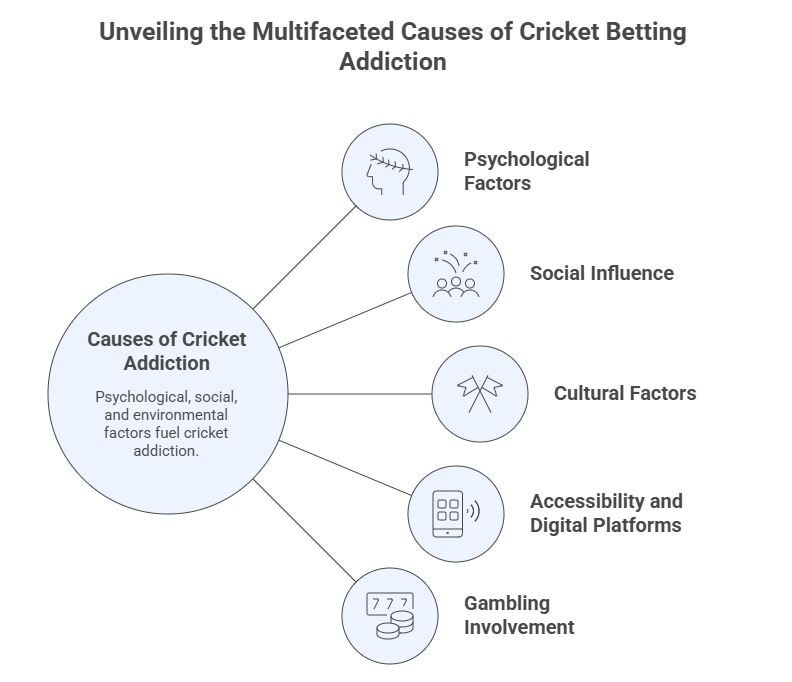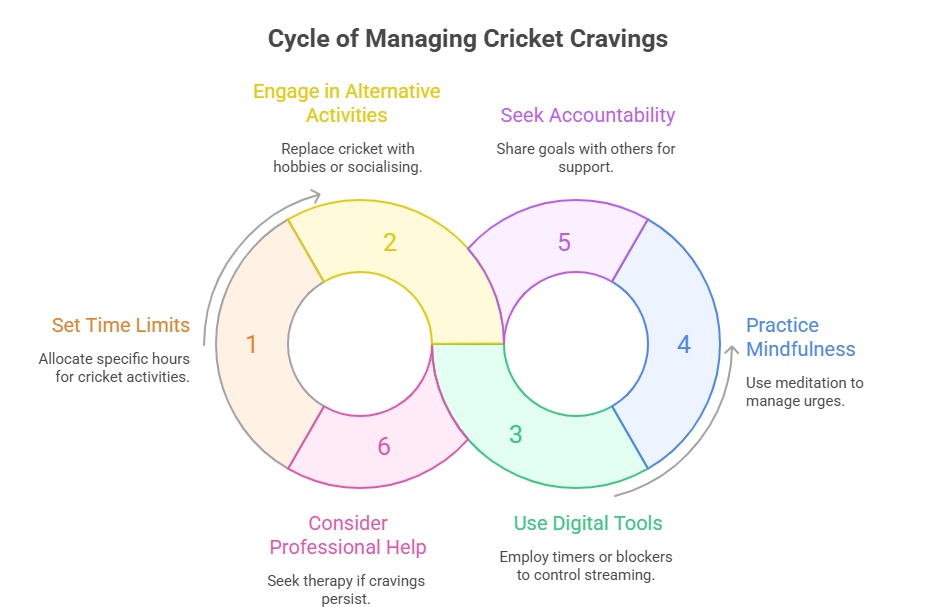Cricket addiction is a behavioural disorder marked by an uncontrollable preoccupation with cricket-related activities that negatively affect daily life, relationships, and mental health. Enthusiasm for cricket quickly becomes compulsive, with individuals spending excessive time watching matches, participating in fantasy leagues, or engaging in betting.
The 2025 Indian Premier League (IPL) final drew 169 million TV viewers and over 840 billion minutes of watch-time, making it one of the most-watched sporting events in India’s history, as published by The Times of India.
The causes of cricket addiction are multifactorial, including psychological triggers, social influences, cultural factors, and accessibility to digital platforms.
The signs involve preoccupation with the sport, emotional distress, neglect of personal responsibilities, and financial strain.
The effects of cricket addiction impact mental and physical health, social relationships, and financial stability.
Treatment for cricket addiction incorporates de-addiction programs such as cognitive behavioural therapy (CBT), lifestyle adjustments, support groups, limiting exposure, and professional counselling. Understanding these aspects is crucial for early recognition and effective intervention.
What Is Cricket Addiction?
Cricket addiction is the excessive and compulsive involvement in cricket-related activities, such as watching matches, playing the sport, engaging in fantasy leagues, or placing bets, that interferes with normal functioning.
While cricket is a cultural passion in India, addiction occurs when the desire to follow the sport becomes uncontrollable, leading to emotional, financial, and social consequences. Individuals with cricket addiction experience anxiety or irritability when unable to follow matches, prioritising cricket over work, studies, or relationships.
In Andhra Pradesh alone, cricket betting has caused at least 9 suicides in 11 months. Many victims were young people who lost heavily in betting, especially on IPL matches. Cases include students and young adults who borrowed money to fund their betting addiction and ultimately took their own lives due to financial and psychological stress.
Behavioural addictions like these share neurobiological patterns with other addictive behaviours, making them challenging to manage without intervention (American Psychiatric Association, DSM-5, 2013).
What Are the Causes of Cricket Addiction?

The causes of cricket addiction are psychological, social, and environmental factors. Common causes of cricket addiction are given below:
- Psychological Factors: Using cricket as a coping mechanism for stress, anxiety, or depression. The emotional highs of matches or fantasy leagues serve as temporary relief.
- Social Influence: Peer pressure and family or friends’ enthusiasm encourage excessive engagement. In India, cricket is a prominent part of social life.
- Cultural Factors: Cricket is deeply embedded in Indian culture, from street cricket to international tournaments. Cultural glorification of the sport normalises all-consuming behaviour.
- Accessibility and Digital Platforms: Mobile apps, streaming services, and fantasy cricket platforms allow constant engagement, increasing the risk of addictive patterns.
- Gambling Involvement: Exposure to betting or fantasy leagues with real money exacerbates obsessional bearing. India has more than 140 million users regularly participating in online gambling and betting, with numbers surging to 370 million during major cricket events like the IPL. Fantasy gaming is also a major segment with over 180 million users, where cricket accounts for 85% of the revenue generated. This growth in betting apps has led to addiction concerns and financial exploitation, with many users falling into cycles of heavy losses and debt, as pointed out in the Deutsche Welle (DW) article “India: Addicted to online betting and fantasy gaming.”
What Are the Signs of Cricket Addiction?
The common signs and symptoms of cricket addiction are behavioural, emotional, and financial. Recognising these early is the basis for intervention.
The symptoms of cricket addiction are as follows:
- Preoccupation: Constantly thinking about upcoming matches, player stats, or fantasy league performance.
- Neglect of Responsibilities: Failing to fulfil work, school, or family obligations.
- Emotional Distress: Anxiety, irritability, or depression when unable to engage in cricket activities.
- Social Withdrawal: Isolating from family or friends to focus on cricket.
- Financial Strain: Overspending on tickets, merchandise, or betting.
What Are the Effects of Cricket Addiction?
The main effects of cricket addiction are wide-ranging and substantially impact an individual’s life.
The effects of cricket addiction are given below:
- Mental Health Impairment: Anxiety, depression, irritability, and mood swings due to obsessive preoccupation.
- Physical Health Issues: Sedentary lifestyle, poor sleep, and fatigue from long hours of watching matches or engaging in online platforms.
- Relationship Strain: Conflicts with family and friends due to neglect or financial disputes.
- Financial Problems: Losses from betting, overspending on tickets, or fantasy league involvement.
- Academic and Work Decline: Poor performance at school or workplace due to distraction and preoccupation.
How does Gambling and Betting Intensify the Cricket Addiction Problem?
Gambling and betting intensify the cricket addiction problem by adding financial risk to the emotional thrill of watching matches. What starts as casual wagers turns into compulsive betting, sparking mounting debts, heightened stress, and stronger dependence on the sport for excitement.
Cricket addiction overlaps with gambling addiction, particularly with the rise of fantasy cricket platforms. Using shared accounts, placing bets on match outcomes, or chasing losses amplifies the overwhelming nature of the addiction, contributing to financial stress and mental health issues. This overlay makes cricket addiction more severe and harder to overcome.
How Does Cricket Addiction Affect Mental Health?
Cricket addiction affects your mental health by elevating anxiety, depression, irritability, and obsessive thinking. The constant emotional roller-coaster of wins and losses triggers stress responses and lowers overall mental well-being. Over time, individuals develop maladaptive coping mechanisms, worsening psychological distress.
How Does Cricket Addiction Affect the Brain?
Cricket addiction affects the brain’s reward pathways, similar to other behavioural addictions. Dopamine release during exciting match moments or fantasy league success reinforces fixated behaviour. Over time, this alters neural pathways, reducing the ability to experience pleasure from non-cricket activities and creating cravings that are difficult to control.
What are the Treatments for Cricket Addiction?
The common treatments for cricket addiction are de-addiction activities like behavioural therapies, lifestyle adjustments, support groups, and professional counselling. Early intervention prevents long-term mental, social, and financial consequences.
The treatment options for cricket addiction are the following:
- Cognitive Behavioural Therapy (CBT): CBT helps individuals identify triggers, challenge maladaptive thoughts, and replace compulsive behaviours with healthier routines. Studies show CBT has a success rate of 50-75% in behavioural addictions (Pybis et al., 2017).
- Support Groups: Peer groups or online communities provide social support, shared experiences, and accountability.
- Lifestyle Modifications: Regular exercise, structured daily routines, and mindfulness techniques cut obsessive tendencies.
- Limiting Exposure: Reducing access to matches, apps, or betting sites breaks the cycle of addiction.
- Professional Counselling: Psychologists or psychiatrists specialising in behavioural addictions offer tailored intervention plans.
How to Manage Cricket Cravings
To manage cricket cravings, do the following:
- Set time limits: Fix specific hours for watching or following cricket and avoid exceeding them.
- Engage in alternative activities: Replace excessive cricket viewing with hobbies like reading, exercising, or socialising.
- Use digital tools: Install screen timers or app blockers to reduce compulsive streaming and betting.
- Practice mindfulness: Techniques like meditation or deep breathing help control impulsive urges.
- Seek accountability: Share your goals with family or friends who monitor your progress.
- Consider professional help: If cravings persist, therapy or counselling provides structured strategies.

Can Cricket Addiction Affect Academic or Work Performance?
Yes, cricket addiction can negatively affect academic or professional responsibilities. Excessive time spent watching or playing cricket spawns missed deadlines, poor concentration, and declining productivity. With time, this neglect results in academic underperformance or workplace issues, eliciting disciplinary actions.
Is Cricket Addiction Similar to Gambling Addiction on Cricket Matches?
Cricket addiction and cricket gambling addiction are different but coincide. Cricket addiction is centred on excessive watching, playing, or following cricket, while gambling addiction involves irrational betting on cricket matches. Both breed financial strain and psychological distress but arise from distinct compulsive behaviours.
Can Children or Teenagers Develop Cricket Addiction?
Yes, children and teenagers can develop cricket addiction due to increased exposure through streaming platforms, social media, and online games. Early signs comprise spending excessive hours watching or playing cricket-related video games, neglecting studies, and social withdrawal.
What Role Can Famil
What Role Can Family Play in Managing Cricket Addiction?
Family members can play a vital role in managing cricket addiction by being aware of early signs, setting boundaries, and encouraging healthier routines. Supportive discussions, limiting screen time, and inspiring individuals in alternative activities minimise dependency. In severe cases, families assist in seeking professional counselling or therapy.
A 2024 study titled “Gambler: Behavioural-Cognitive Treatment of Online Gambling Disorder. A Step-by-Step Treatment Guide” by Choliz M. and Marcos-Moliner M. found that among 40 patients diagnosed with online gambling addiction, 28 remained abstinent after one year, demonstrating a 70% success rate in treatment outcomes.





